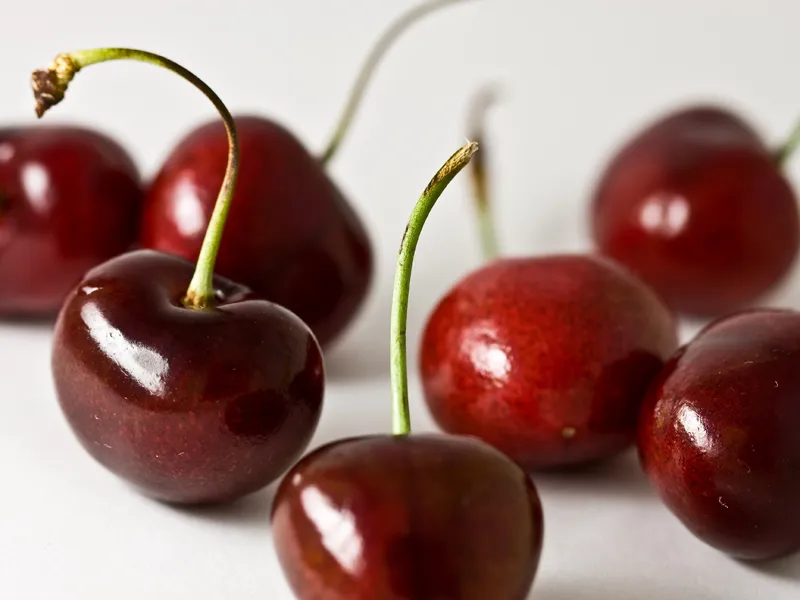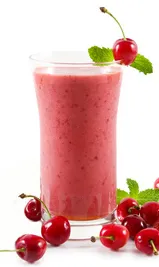Cherries: just a fruity way to vary your diet, or are there healing properties hidden in these tasty red gems? Scientist have suggested they hold a secret ingredient that will help repair muscle damage. Let’s take a look at an example of the research, and whether this could be a useful dietary change for triathletes.
The tests
A recent study investigated the effect drinking tart cherry juice in the lead up to a marathon had on recovery after the race. Researchers took 20 recreational marathon runners (with approximate finish times of four hours) and got them to drink around 50ml of either a commercially available tart cherry juice drink, or a taste- and calorie-matched placebo, for five days before running the 2008 London Marathon.
They continued to take the drinks for three days afterwards. Blood samples were taken six days before the marathon, the day before, immediately on completion of the race, and at one and two days after the event. These were then analysed for markers of muscle damage. Muscle soreness and the force a leg could exert were measured one day before the marathon, and also measured after the race was completed.
The results
Let’s start with the recovery of muscle force. In both groups there was a decrease in muscle force of around 25 percent as a consequence of running the race. Force in both groups started to recover after 24 hours, but was much greater in the cherry juice group. In fact, after two days, the cherry juice group’s muscle force was equal to the level it was before the event, whereas the placebo group was 10% less than baseline.
This suggests that drinking the cherry juice drink enabled the muscle to recover more quickly than it normally would. Blood markers essentially looked at how stressed the body was from completing the marathon. These markers clearly showed a trend towards the body being less stressed when cherry juice was consumed. For those of a scientific mind, interleukin-6 and c-reactive protein were both significantly lower and creatine kinase showed a trend to being lower with cherry juice supplementation.
Why it works?
The cherry juice used in this study showed to have a high antioxidant capacity and was particularly high in nutrients in the polyphenol family, such as anthocyanins, catechins and quercetin. These nutrients have a large antioxidant capacity. This means that they are able to help the body cope with oxidative stress.
An easy way to think of oxidative stress is when oxygen goes crazy and attacks your body. Some of it is good and is important in many of the body’s processes. But as with many things, too much is bad and is implicated in fatigue and muscle damage.
In the study, which was carried out by Howatson et al in 2009, the group that drank the cherry juice drink increased their total antioxidant status (TAS) compared to the placebo group. This increase allowed the body to have a greater defence against oxidative stress, and therefore recover more quickly.
The verdict
The study appears to be useful and seems to show that drinking cherry juice can help you recover from a punishing event more quickly. So how should you apply this to your training? Using drinks with a high antioxidant capacity can help cyclists to cope when they are training hard, as it will aid recovery and allow you to push yourself that little bit more. If you train less than 10 hours a week, it may not be worth it. What this study does show is the importance of eating a good range of fruit and vegetables in your diet.
The diet of the runners was not analysed, and it could be that they simply were replacing what they should have got through eating – plenty of fruit and veg. The highest antioxidant foods tend to be those that are dark red in colour such as cherries, red grapes and pomegranates. Look to include at least one serving of a dark red coloured fruit in your diet each day.
Recipe: Cherry Bakewell smoothie
Try this antioxidant smoothie
You will need:
- 1 pint semi-skimmed milk
- 20g almond butter
- 10 cherries – stones removed
Instructions
Place all the ingredients in a blender and blend until smooth.
Recovery advantages
Milk is a great recovery food. Research has shown that it's just as effective as any recovery drink in maximising the body’s repair after exercise, and has a good mix of carbs and complete proteins. Cherries have been shown to decrease the delayed onset of muscle soreness after a hard training session. This could be particularly useful for any off-season gym sessions.
Energy: 440kcal. Carbohydrate: 40g. Protein: 25g. Fat: 21g.

